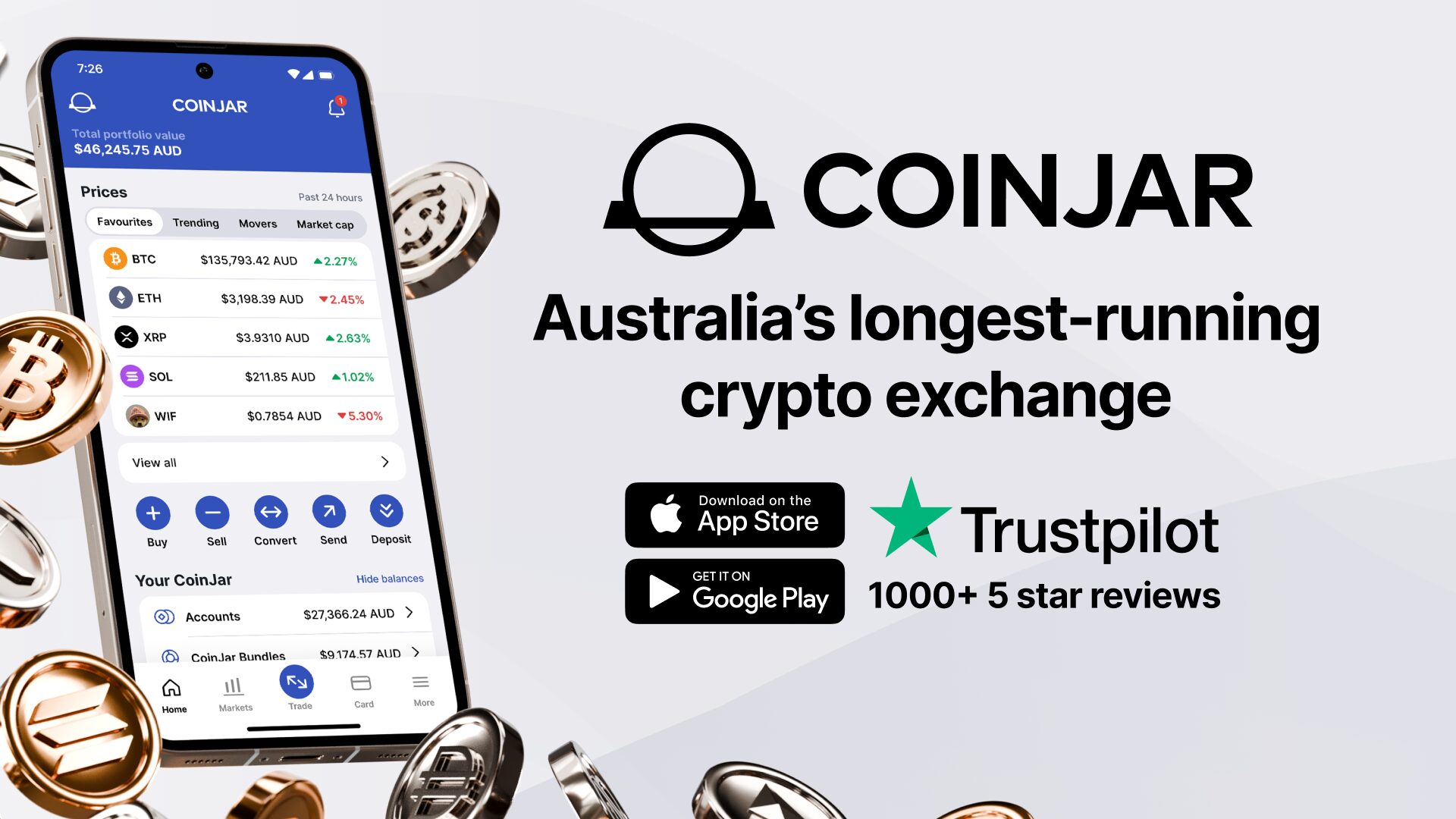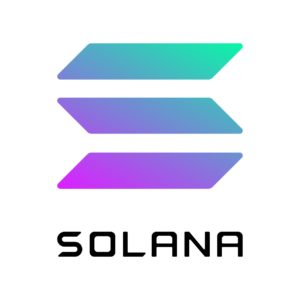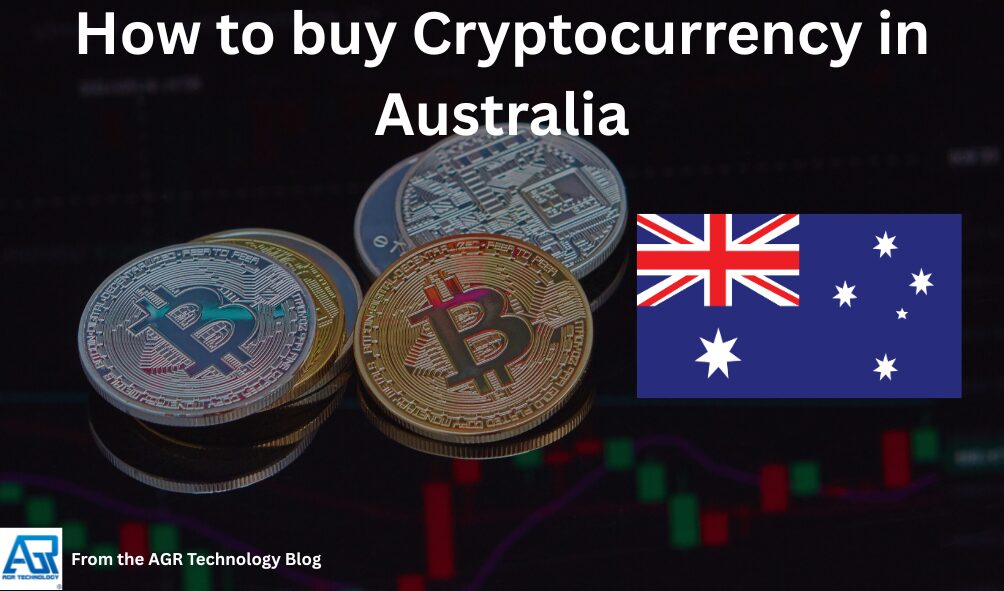Disclosure: This article was sponsored by Coinjar which is a Cryptocurrency exchange platform, the contents of this article do not necessarily reflect the views of AGR Technology
A beginners guide to buying Crypto in Australia for February 2026
You might be asking yourself, now that I am interested in cryptocurrencies, how do I buy crypto in Australia, and what do I buy? If you are ready to enter the realm of cryptocurrency, then read on, because it is a lot more straightforward than you think. For this explanation, we will use the crypto exchange called CoinJar.
CoinJar has an app that is perfect for beginners. Most people start on the app, because it gives CoinJar customers their own wallet inside CoinJar. Beginners don’t need to learn how to create a separate wallet right away. They can just hold their normal money and their cryptocurrencies in their CoinJar account.
After people get used to the app, they can then move on to the CoinJar Exchange if they feel ready.
CoinJar, established in 2013, is Australia’s longest-running cryptocurrency exchange, based in Melbourne. CoinJar offers some of the lowest trading fees in Australia, for example CoinJar Exchange fees are 0%-0.1%.
Be sure to read this article about crypto scams before going ahead.
So here’s how to start buying crypto:
Step 1: Set Up and Verify Your Account

Once you’ve chosen CoinJar, create an account by providing personal details. You’ll need to complete an identity verification process, which involves submitting ID documents and linking a bank account. This might take a few minutes.
Step 2: Add Funds to Your Account
So now that your ID has been verified, you can purchase crypto. To do this, you’ll need to deposit money into your CoinJar account.
Options include:
- Bank Transfer: Move fiat currency, like Australian dollars, directly from your bank to CoinJar (no fee).
- Credit or Debit Card: Use CoinJar’s Instant Buy feature for quick crypto purchases with your card (this is instant but it has a small fee, whereas doing a bank transfer is free).
- Crypto-to-Crypto Transactions: After your first purchase, you can use your crypto to buy other cryptocurrencies on the platform (this has a 1% fee).
- You can also use PayID (no fee), ApplePay (2% fee) and GooglePay (2% fee). Choose the payment method that best fits your needs.
Step 3: Pick Your Cryptocurrency
Now it’s time to decide which crypto to buy. Popular choices on CoinJar include Bitcoin (BTC), Ethereum (ETH), and XRP (XRP). Take your time to explore and select a coin that aligns with your strategy.
Step 4: Make Your Purchase
With your coin selected, tap in the CoinJar app, “trade”.
Your crypto will appear in your CoinJar wallet under the “Accounts” tab.
Step 5: Safeguard Your Crypto
After buying, you can leave your crypto in your CoinJar wallet for easy access to trade or sell.
When you get more confident with crypto, you can set up a separate, external wallet and transfer your crypto into your own wallet. However, you can leave it in your CoinJar wallet for as long as you like, if you don’t want to bother with an external wallet.
Buying Crypto as a Beginner
Buying cryptocurrency is an exciting step, and with CoinJar’s straightforward platform, it’s convenient and easy to understand. By following these steps, you’ll be well on your way to navigating the crypto world.
Top Cryptocurrencies for Beginners on CoinJar
1) Bitcoin (BTC) – Score: 9/10

The first and most widely recognised cryptocurrency. It’s the gold standard of crypto, ideal for new investors looking for a long term investment in crypto’s famously volatile ups and downs.
Ethereum (ETH) – Score: 9/10
![]()
Ethereum is a great pick for beginners interested in the innovative side of crypto. It is the crypto used when developers make smart contracts, NFTs, and decentralised apps.
USD Coin (USDC) – Score: 9/10

A stablecoin pegged to the US dollar, can be used for parking your funds during market dips. It’s a good back-up option for beginners. However it is not thought of as an investment, due to it being designed to always be worth USD$1.
XRP (XRP) – Score: 8/10

Known for speedy and low-cost transactions, XRP is used by the banking industry, making it one of the most interesting real-life use cases in the world.More famous than ever for being caught up in court cases which they have largely won.
Polygon (POL) – Score: 8/10

This token is used on Ethereum, so transactions are usually cheaper. Perfect for exploring the Ethereum ecosystem. It’s a bit more niche than Bitcoin or Ethereum, but gamers use it to game hard.
Chainlink (LINK) – Score: 8/10

Connects real-world data to blockchains, making it a key player in decentralised finance. A solid choice for forward-thinking beginners. A bit more complex than Bitcoin or Ethereum.
Solana (SOL) – Score: 8/10

Solana supports a wide range of decentralised applications, from DeFi to NFTs to memecoins, providing beginners with exposure to diverse use cases without needing advanced technical knowledge.
Troubleshooting Common Issues
Australian crypto investors frequently encounter technical and administrative challenges when purchasing digital assets. These issues range from banking restrictions to verification delays that can prevent or postpone cryptocurrency transactions.
Bank Blocking Transactions
Australian banks occasionally block cryptocurrency transactions through automatic fraud detection systems and specific crypto exchange restrictions. Commonwealth Bank imposes a $10,000 monthly limit on crypto exchange deposits. Westpac, NAB, and ANZ can implement similar blocks or restrictions on certain exchanges. HSBC blocks all cryptocurrency exchange transactions from customer accounts.
Banks block transactions for three primary reasons:
- Security concerns about unregistered or international exchanges
- Fraud prevention measures triggered by unusual transaction patterns
- Risk management policies against cryptocurrency volatility
Resolving bank blocks requires immediate action:
- Contact the bank directly to verify the transaction legitimacy
- Request manual approval for the specific crypto exchange
- Confirm exchange AUSTRAC registration status with bank representatives
- Switch to PayID transfers which face fewer restrictions than card payments
- Open accounts with crypto-friendly banks like ING or Macquarie if blocks persist
Verification Problems
Identity verification failures prevent account activation on Australian crypto exchanges. AUSTRAC regulations require exchanges to verify customer identities through Know Your Customer (KYC) protocols. Common verification issues include document quality problems and information mismatches.
Document rejection occurs when:
- Image quality falls below platform requirements (blurry photos or glare)
- Document expiration makes ID invalid for verification
- Information discrepancies exist between application details and documents
- Address verification fails due to outdated proof of residence
Fixing verification problems involves:
- Submit high-resolution photos in well-lit conditions without shadows
- Update expired documents before resubmitting verification
- Match all details exactly between registration forms and official documents
- Provide recent utility bills dated within 3 months for address proof
- Contact exchange support after 48 hours if verification remains pending
Transaction Delays
Cryptocurrency purchase delays affect Australian investors during high-volume trading periods and technical disruptions. Bank transfer delays account for most transaction holdups, taking 1-3 business days for standard processing. Network congestion on blockchains creates additional delays for cryptocurrency transfers.
Processing times vary by payment method:
| Payment Method | Standard Processing Time | Delay Factors |
|---|---|---|
| Bank Transfer | 1-3 business days | Weekend processing, bank holidays |
| PayID | 5-30 minutes | Bank verification checks |
| Credit Card | Instant-24 hours | Fraud checks, first-time use |
| Cryptocurrency | 10 minutes-2 hours | Network congestion, confirmation requirements |
Minimizing transaction delays requires:
- Use PayID for faster deposits compared to standard bank transfers
- Avoid peak trading hours when exchange servers experience high load
- Check blockchain network status before initiating crypto transfers
- Increase network fees during congestion for priority processing
- Verify recipient addresses to prevent failed transactions requiring manual intervention
- System maintenance windows scheduled weekly or monthly
- Security reviews triggered by large transactions over $10,000
- Account verification updates requiring additional documentation
- Regulatory compliance checks for international transfers
Key Takeaways
- Cryptocurrency is completely legal in Australia – All exchanges must register with AUSTRAC and comply with anti-money laundering regulations to protect investors
- Multiple payment methods are available – Australian investors can buy crypto using bank transfers (lowest fees at 0-1%), credit/debit cards (instant but 1.8-4.5% fees), PayID, PayPal, or Bitcoin ATMs
- Start with proper security setup – Enable two-factor authentication, choose between hot wallets for trading or cold storage for long-term holdings, and never share private keys
- Popular cryptocurrencies include Bitcoin and Ethereum – 31% of Australian adults possess cryptocurrency, up from 28% last year. According to Australian census data, approximately 6.2 million persons hold or have held cryptocurrency.
- Cryptocurrency transactions are taxable in Australia – The ATO treats crypto as property subject to capital gains tax, with a potential 50% discount available for holdings over 12 months
- Common issues have simple solutions – Bank transaction blocks can be resolved by contacting your bank or using PayID, while verification problems typically require clearer document photos
Conclusion
The Australian cryptocurrency market offers investors numerous opportunities to diversify their portfolios and potentially achieve significant returns. With over 16 AUSTRAC-registered exchanges operating locally and multiple payment methods available, getting started has never been more accessible.
Security remains paramount when investing in digital assets. Investors who implement proper security measures like two-factor authentication and cold storage wallets significantly reduce their risk exposure. Understanding tax obligations and maintaining detailed transaction records ensures compliance with ATO requirements while maximizing potential CGT benefits.
While challenges like banking restrictions and verification delays may arise, they’re typically manageable with the right approach and preparation. As the regulatory landscape continues to evolve with upcoming AFSL requirements for exchanges, the Australian crypto market’s moving toward greater consumer protection and market stability.
For those ready to begin their cryptocurrency journey, starting small and gradually building knowledge and experience provides the best foundation for long-term success. The combination of proper research, security practices and regulatory compliance creates a solid framework for participating in this dynamic market.
Frequently Asked Questions
Is cryptocurrency legal in Australia?
Yes, cryptocurrency is completely legal in Australia. You can buy, sell, and hold digital currencies like Bitcoin, Ethereum, and Solana. All cryptocurrency exchanges operating in Australia must register with AUSTRAC and comply with anti-money laundering regulations to ensure safe trading environments for investors.
What do I need to buy cryptocurrency in Australia?
To buy cryptocurrency in Australia, you need a valid ID (driver’s license or passport), an Australian bank account or credit card, and a digital wallet to store your crypto. You’ll also need to create an account on a registered exchange and complete identity verification before making your first purchase.
Do I pay tax on cryptocurrency in Australia?
Yes, the Australian Taxation Office (ATO) treats cryptocurrency as property subject to capital gains tax. When you sell, trade, or exchange crypto, you trigger a taxable event. However, personal use purchases under may be exempt, and holdings over 12 months may qualify for a 50% CGT discount (source).
Which cryptocurrency exchanges are registered in Australia?
Over 16 cryptocurrency exchanges are registered with AUSTRAC in Australia, including international & local exchanges. All registered exchanges must comply with anti-money laundering laws and implement strict security measures to protect user funds and personal information.
What’s the safest way to store cryptocurrency?
The safest storage method is using a hardware wallet (cold storage) that keeps your private keys offline. For smaller amounts or frequent trading, hot wallets on reputable exchanges with two-factor authentication work well. Never share your private keys and always backup your wallet recovery phrases securely.
How much does it cost to buy Bitcoin in Australia?
Costs vary by payment method and exchange. Bank transfers typically have the lowest fees (0.1-1%), while credit cards charge 2-4% plus potential cash advance fees. Additional costs include exchange trading fees, withdrawal fees, and network fees when transferring crypto between wallets.
Can Australian banks block cryptocurrency purchases?
Yes, some Australian banks may block or restrict cryptocurrency transactions due to fraud prevention policies. If your transaction is blocked, contact your bank directly to authorize the payment. Alternatively, consider using crypto-friendly banks or payment methods like PayID that typically have fewer restrictions.
What’s the minimum amount to invest in cryptocurrency?
Most Australian exchanges allow minimum purchases as low as $5-10 AUD. This makes cryptocurrency accessible to beginners who want to start small. However, consider that fixed withdrawal fees might eat into small investments, so buying slightly larger amounts can be more cost-effective.
Disclaimer:
AGR Technology may receive a commission on sales generated by partner links on this page. Crypto assets can be highly volatile unregulated investment products and like any type of investment can increase or decrease in value. By no means is this article designed to be financial advice. While we vet each platform we mention on our website and provide regular content updates, we recommend that you conduct extensive research before making investment decisions, form your own opinion, and invest only what you can afford to lose because there is no such thing as a guarantee in investing.
Source(s) cited:
Brand Assets [Online]. Chainlink. Available at: https://chain.link/brand-assets (Accessed: 19 June 2025).
https://www.iconfinder.com/icons/2909601/download/png/512
[Online]. Available at: https://www.ato.gov.au/individuals-and-families/investments-and-assets/crypto-asset-investments/how-to-work-out-and-report-cgt-on-crypto (Accessed: 19 June 2025).
“Buy Polygon (POL) in Australia With AUD” CoinJar, www.coinjar.com/au/buy/polygon. Accessed 19 June 2025.
“Buy XRP (XRP) in Australia With AUD” CoinJar, www.coinjar.com/au/buy/ripple. Accessed 19 June 2025.
“Buy USDC (USDC) in Australia With AUD.” CoinJar. Accessed June 19, 2025. https://www.coinjar.com/au/buy/usd-coin.
Buy Ethereum (ETH) in Australia With AUD. CoinJar. https://www.coinjar.com/au/buy/ethereum. Accessed June 19, 2025.
“Just a moment….” Accessed June 19, 2025. https://koinly.io/blog/crypto-friendly-banks-australia/.
“Buy Bitcoin (BTC) in Australia With AUD”, CoinJar. [Online]. Available: https://www.coinjar.com/au/buy/bitcoin. [Accessed: 19-June-2025].
C. Lua, (2025). Crypto Tax in Australia: A Complete Guide [Online]. Available at: https://sleek.com/au/resources/crypto-tax/ (Accessed: 19 June 2025).
Roberts, Ben. “How many people own Bitcoin and crypto in Australia?.” April 3, 2025. Accessed June 19, 2025. https://www.independentreserve.com/blog/knowledge-base/how-many-people-own-bitcoin-and-crypto-in-australia.
“Buy Solana (SOL) in UK With GBP” CoinJar, www.coinjar.com/uk/buy/solana. Accessed 19 June 2025.
“Buy Chainlink (LINK) in Australia With AUD” CoinJar, www.coinjar.com/au/buy/chainlink. Accessed 19 June 2025.

Alessio Rigoli is the founder of AGR Technology and got his start working in the IT space originally in Education and then in the private sector helping businesses in various industries. Alessio maintains the blog and is interested in a number of different topics emerging and current such as Digital marketing, Software development, Cryptocurrency/Blockchain, Cyber security, Linux and more.
Alessio Rigoli, AGR Technology
![logo-new-23[1] logo-new-23[1]](https://agrtech.com.au/wp-content/uploads/elementor/thumbs/logo-new-231-qad2sqbr9f0wlvza81xod18hkirbk9apc0elfhpco4.png)

